
ERKENNTNIS
Scope & Guideline
Elevating standards of excellence in philosophical research.
Introduction
Aims and Scopes
- Epistemology and Knowledge Theory:
Exploration of the nature, scope, and limits of knowledge, including discussions on belief, justification, and the dynamics of epistemic norms. - Metaphysics and Ontology:
Investigation into the fundamental nature of reality, including discussions on existence, identity, causality, and the structure of objects and properties. - Philosophy of Science:
Critical analysis of scientific methods, theories, and practices, including examination of scientific realism, confirmation theory, and the role of models in scientific inquiry. - Ethics and Moral Philosophy:
Engagement with normative theories, moral responsibility, and the intersection of ethics with epistemology and metaphysics. - Philosophical Methodology and Logic:
Examination of logical frameworks, argumentation strategies, and the role of formal methods in philosophical analysis. - Interdisciplinary Approaches:
Integration of insights from cognitive science, psychology, and social theory to enrich philosophical discussions and address contemporary issues.
Trending and Emerging
- Cognitive Phenomenology:
An increasing number of papers explore the nature of consciousness and cognitive processes, emphasizing the experiential aspects of thought and perception. - Normative Epistemology:
There is a growing interest in the normative dimensions of epistemology, particularly regarding how knowledge claims and belief systems are evaluated in social contexts. - Philosophy of Technology and AI:
As technology continues to advance, discussions surrounding its philosophical implications, including ethics and epistemology related to AI, are becoming more prevalent. - Interdisciplinary Philosophy:
A notable trend towards integrating insights from various fields such as neuroscience, psychology, and social science, reflecting a more holistic approach to philosophical inquiry. - Environmental Ethics and Philosophy:
Emerging discussions on ethical considerations related to environmental issues and sustainability are increasingly present, indicating a responsiveness to global challenges.
Declining or Waning
- Traditional Analytic Philosophy:
There seems to be a waning emphasis on traditional analytic methods, with fewer papers focusing solely on classical debates in analytic philosophy. - Experimental Philosophy:
Although previously a growing trend, the explicit focus on experimental philosophy appears to be diminishing, possibly as researchers seek more theoretical or conceptual analyses. - Specific Historical Philosophical Figures:
The frequency of papers dedicated to specific historical figures or schools of thought has decreased, indicating a shift towards more contemporary and integrative discussions.
Similar Journals

JOURNAL OF PHILOSOPHY
Catalyzing critical discourse in contemporary philosophy.The Journal of Philosophy, with ISSN 0022-362X and E-ISSN 1939-8549, is a premier academic publication in the field of philosophy, published by J Philosophy Inc. Located in the United States at Columbia University, 709 Philosophy Hall, New York, NY 10027, this esteemed journal serves as a critical platform for rigorous scholarly discourse and innovative research. With a commendable Impact Factor and ranked in the top Q1 category for Philosophy in 2023, the journal holds a prominent position within the academic community, attracting contributions that push the boundaries of philosophical inquiry. The Journal of Philosophy has consistently ranked in the 91st percentile in the Scopus Arts and Humanities rankings (Rank #65/806), underscoring its influence and the relevance of its published works. Though it operates on a subscription model, the journal’s extensive back-catalog and current issues provide invaluable resources for researchers, professionals, and students alike, promoting a deeper understanding of philosophical concepts and stimulating meaningful discussions in contemporary thought.

Acta Analytica-International Periodical for Philosophy in the Analytical Tradition
Unpacking complex ideas with clarity and precision.Acta Analytica is a premier international periodical dedicated to advancing the field of philosophy within the analytical tradition. Published by SPRINGER in the Netherlands, this journal has steadily established itself as a vital resource for scholars and practitioners, evidenced by its prestigious Q1 categorization in the 2023 Philosophy rankings and an impressive Scopus rank of #183 out of 806 in the Arts and Humanities category, placing it within the 77th percentile. With coverage spanning from 2009 to 2024, the journal encompasses a broad spectrum of philosophical discourse that fosters dialogue and encourages intellectual rigor among its contributors and readers alike. Although not an open-access journal, it ensures quality and accessibility to an audience passionate about the analytical approach to philosophical questions. Acta Analytica invites researchers, professionals, and students to engage with its rich and thought-provoking content, making it an essential addition to any philosophy-oriented collection.
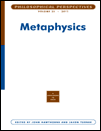
Philosophical Perspectives
Elevating scholarly communication in philosophy.Philosophical Perspectives is a premier academic journal published by WILEY, dedicated to advancing the field of philosophy through innovative and rigorous research. Established more than two decades ago, this esteemed UK-based journal carries the ISSN 1520-8583 and E-ISSN 1758-2245, and it has earned a reputation for quality, as reflected in its ranking in the top quartile (Q1) for philosophy. With an impressive Scopus rank of #152 out of 806 and a respectable 81st percentile standing, it is a significant platform for scholars seeking to disseminate their findings and contribute to philosophical discourse. The journal's objectives include fostering critical thought and interdisciplinary dialogue, making it an essential resource for researchers, professionals, and students alike. Although it does not currently offer open access options, its content is meticulously curated to ensure relevance and depth, covering a wide array of philosophical topics from ethics to metaphysics. As a vital part of the philosophical community, Philosophical Perspectives continues to shape the future of philosophical inquiry and practice.
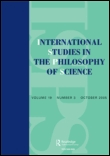
International Studies in the Philosophy of Science
Exploring the philosophical foundations of scientific inquiry.International Studies in the Philosophy of Science is a distinguished journal published by Routledge Journals, Taylor & Francis Ltd, dedicated to advancing scholarly dialogue in the intersecting realms of philosophy and science. With an ISSN of 0269-8595 and an E-ISSN of 1469-9281, this journal offers a carefully curated collection of research articles, reviews, and discussions that explore critical philosophical questions related to scientific methods, theories, and ethics. Although coverage for the journal in Scopus has been discontinued since 2017, it still maintains a respectable position with a rank of #75 out of 140 in the Arts and Humanities category, showcasing its relevance within the field. While it currently does not offer open access, the journal continues to be an essential resource for researchers, professionals, and students seeking to deepen their understanding of the philosophical underpinnings that inform scientific inquiry. By putting a spotlight on interdisciplinary approaches and fostering robust academic debate, International Studies in the Philosophy of Science plays a vital role in shaping the future discourse in the philosophy of science.
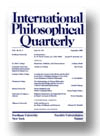
INTERNATIONAL PHILOSOPHICAL QUARTERLY
Advancing Critical Dialogue in PhilosophyINTERNATIONAL PHILOSOPHICAL QUARTERLY, published by the PHILOSOPHY DOCUMENTATION CENTER, stands as a vital resource for scholars and practitioners engaged in philosophical inquiry. With an ISSN of 0019-0365 and an E-ISSN of 2153-8077, this esteemed journal has published thought-provoking discussions and analyses in philosophy since its inception in 1974. The journal is housed in the United States at PO BOX 7147, CHARLOTTESVILLE, VA 22906-7147, and has shown a commitment to advancing philosophical debates across its converged years from 1974 to 2023. Recognized with a Q3 rating in the philosophy category for 2023, it ranks 511 out of 806 within Scopus, positioning it within the 36th percentile of its peers. Although not an open-access publication, it continues to offer critical insights that foster scholarly dialogue and research within the field. This journal is especially pertinent to researchers, professionals, and students who seek to deepen their understanding of contemporary philosophical issues and engage with a diverse array of philosophical perspectives.

SYNTHESE
Exploring the depths of interdisciplinary inquiry.SYNTHESE is a prestigious academic journal published by Springer, renowned for its contributions to the fields of Philosophy and Social Sciences. With a distinguished history dating back to its inception in 1936, this journal continues to thrive, offering a platform for innovative and critical discourse. Recognized for its excellence, SYNTHESE holds a remarkable Q1 quartile ranking in both Philosophy and Social Sciences (miscellaneous) as of 2023, placing it within the top tier of scholarly publications. Its impressive Scopus rankings further underscore its influence, boasting a rank of #48 out of 806 in Philosophy and #70 out of 275 in General Social Sciences, thereby reflecting a 94th percentile in the arts and humanities. The journal's scope encompasses a wide array of interdisciplinary and philosophical inquiries, making it a vital resource for researchers, professionals, and students seeking to deepen their understanding of complex social issues. With access options that promote scholarly connectivity, SYNTHESE is committed to advancing knowledge and fostering intellectual engagement within the global academic community.

Epistemology & Philosophy of Science-Epistemologiya i Filosofiya Nauki
Elevating the Standards of Philosophical ResearchEpistemology & Philosophy of Science-Epistemologiya i Filosofiya Nauki is a prestigious journal published by the Russian Academy of Sciences - Institute of Philosophy, dedicated to advancing the discourse in the fields of epistemology, philosophy of science, and related disciplines. With a distinguished presence in academia, this journal is recognized for its exceptional contributions, evident through its categorization as a Q2 journal in Arts and Humanities and Philosophy, and a Q1 journal in Cultural Studies. Covering an expansive scope from 2017 to 2023, it facilitates a vital dialogue among scholars and professionals aiming to explore the intersections of knowledge, culture, and education. Although currently not open access, the rigorous peer-review process ensures that only high-quality research is published, enriching the intellectual landscape. The journal's commendable rankings in Scopus, particularly in Arts and Humanities and History and Philosophy of Science, reflect its commitment to scholarly excellence. For researchers, educators, and students, Epistemology & Philosophy of Science serves as an essential resource for understanding and contributing to the ongoing philosophical dialogues that shape our comprehension of scientific inquiry.
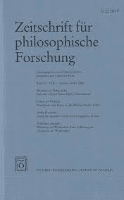
ZEITSCHRIFT FUR PHILOSOPHISCHE FORSCHUNG
Advancing Scholarly Discourse in Philosophy.ZEITSCHRIFT FUR PHILOSOPHISCHE FORSCHUNG is a prestigious academic journal published by Vittorio Klostermann GmbH in Germany, dedicated to the interdisciplinary field of philosophy. With its ISSN 0044-3301 and E-ISSN 1439-2615, this journal has made significant contributions to the philosophical discourse since its inception in 1977, continuing its pursuit of excellence in scholarship through 2024. Recognized in the 2023 category quartiles as Q2 in Philosophy, it is ranked #498 out of 806 in the Arts and Humanities' Philosophy classification by Scopus, placing it in the 38th percentile. Although it currently does not offer open access options, its rigorous peer-reviewed articles serve to enrich the scholarly community's understanding of complex philosophical issues. ZEITSCHRIFT FUR PHILOSOPHISCHE FORSCHUNG plays a vital role in advancing philosophical research in a collaborative academic environment, making it a valuable resource for researchers, professionals, and students alike.

PHILOSOPHIA
Unveiling Contemporary Debates in PhilosophyPHILOSOPHIA is an esteemed academic journal published by Springer, focusing on the diverse field of philosophy. With an ISSN of 0048-3893 and E-ISSN 1574-9274, this journal serves as a prestigious platform for innovative philosophical discourse and research. Based in the Netherlands at VAN GODEWIJCKSTRAAT 30, 3311 GZ DORDRECHT, PHILOSOPHIA has garnered a reputation for its high-quality contributions, maintaining a Q1 classification in Philosophy and ranking 229 out of 806 in the Scopus Arts and Humanities category, placing it within the top 71st percentile. The journal's scope spans critical analyses and contemporary debates, making it an essential resource for philosophers, scholars, and students seeking to engage with cutting-edge ideas. Although it does not currently offer open access, its rigorous review process and academic integrity ensure that published articles are of the highest scholarly standard. With its convergence of contributions since 1971 and ongoing commitment to advancing philosophical inquiry, PHILOSOPHIA remains pivotal in shaping both theoretical and practical understandings within the discipline.
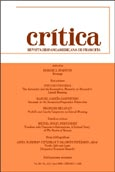
CRITICA-REVISTA HISPANOAMERICANA DE FILOSOFIA
Engaging Minds, Shaping DiscourseCRITICA-REVISTA HISPANOAMERICANA DE FILOSOFIA, published by CRITICA in Mexico, is a prominent peer-reviewed journal established in 1977 that has continually contributed to the field of philosophy in the Hispanic world. With an ISSN of 0011-1503 and an E-ISSN of 1870-4905, this journal plays a significant role in disseminating philosophical discourse, engaging both established and emerging scholars. It holds a Q3 ranking in the field of Philosophy according to the 2023 Category Quartiles and is ranked 305 out of 806 in the Scopus Arts and Humanities: Philosophy category, placing it in the 62nd percentile. Although it does not offer an open access option, its commitment to quality and relevance makes it an essential resource for researchers and students eager to explore contemporary philosophical issues and debates. The journal remains a vital platform for intellectual exchange, encouraging diverse perspectives that enrich the landscape of philosophical inquiry.